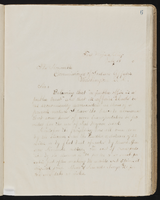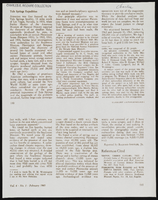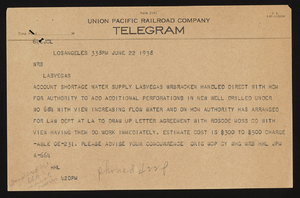Search the Special Collections and Archives Portal
Search Results
Political Affairs, Nevada - General Files. Contains correspondence, memos, reports and news articles, 1961 March to 1962 November
Level of Description
File
Archival Collection
Howard Cannon Papers
To request this item in person:
Collection Number: MS-00002
Collection Name: Howard Cannon Papers
Box/Folder: Box 22 (87th Session)
Collection Name: Howard Cannon Papers
Box/Folder: Box 22 (87th Session)
Archival Component
Political Affairs, Nevada - State Democratic Central Committee. Contains correspondence, memos, notices and reports, 1961 February to 1962 April
Level of Description
File
Archival Collection
Howard Cannon Papers
To request this item in person:
Collection Number: MS-00002
Collection Name: Howard Cannon Papers
Box/Folder: Box 22 (87th Session)
Collection Name: Howard Cannon Papers
Box/Folder: Box 22 (87th Session)
Archival Component
Political Affairs, Nevada - Democratic Clubs - Clark County. Contains correspondence, memos and reports, 1961 January to 1962 August
Level of Description
File
Archival Collection
Howard Cannon Papers
To request this item in person:
Collection Number: MS-00002
Collection Name: Howard Cannon Papers
Box/Folder: Box 22 (87th Session)
Collection Name: Howard Cannon Papers
Box/Folder: Box 22 (87th Session)
Archival Component
Political Affairs, Nevada - Democratic Committees - Clark County. Contains correspondence, memos, statements and reports, 1961 April to 1962 July
Level of Description
File
Archival Collection
Howard Cannon Papers
To request this item in person:
Collection Number: MS-00002
Collection Name: Howard Cannon Papers
Box/Folder: Box 22 (87th Session)
Collection Name: Howard Cannon Papers
Box/Folder: Box 22 (87th Session)
Archival Component
Post Office, Mail - Rate Increases, etc. Contains correspondence, memos, reports, statements and lists, 1959 March to 1962 October
Level of Description
File
Archival Collection
Howard Cannon Papers
To request this item in person:
Collection Number: MS-00002
Collection Name: Howard Cannon Papers
Box/Folder: Box 22 (87th Session)
Collection Name: Howard Cannon Papers
Box/Folder: Box 22 (87th Session)
Archival Component
Jane Feldman's administrative and subject files, 1997 to 2021
Level of Description
File
Archival Collection
Sierra Club Toiyabe Chapter Records
To request this item in person:
Collection Number: MS-00289
Collection Name: Sierra Club Toiyabe Chapter Records
Box/Folder: Box 22, Box 23, Box 24, Digital File 00
Collection Name: Sierra Club Toiyabe Chapter Records
Box/Folder: Box 22, Box 23, Box 24, Digital File 00
Archival Component
Adele Baratz oral history interview
Identifier
OH-00076
Abstract
Oral history interview with Adele Baratz conducted by Claytee White on March 19, 2007 for the Boyer Early Las Vegas Oral History Project. Baratz discusses the early Jewish community in Las Vegas, Nevada, including how education, shopping and restaurants such as Al's Bar were like. She also discusses how medical care, Helldorado, and early hotels advanced.
Archival Collection

Pagination
Refine my results
Content Type
Creator or Contributor
Subject
Archival Collection
Digital Project
Resource Type
Year
Material Type
Place
Language
Records Classification


